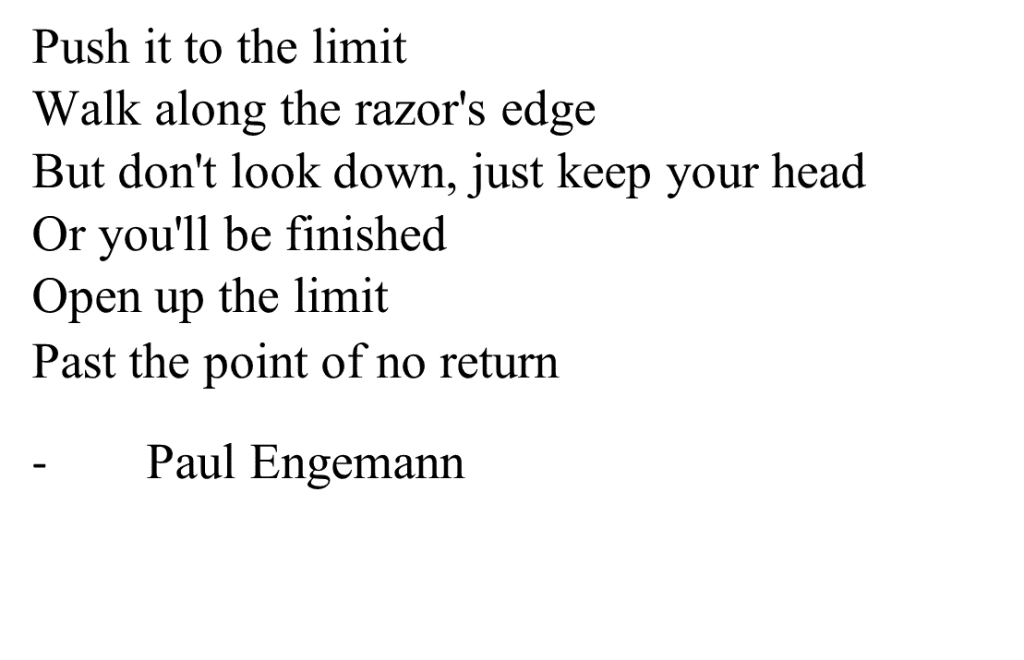This post is the first post in a series that discusses the limits of conceivability. I draw lessons concerning our ability to conceive and reason about possible future from three argumentative cases in philosophy of science.
In this post, I introduce the problem.
In the next post, contextualize the philosophical cases on the theoretical and methodological discussion on the relationships between history, counterfactual scenarios, and future studies.
In Part 3, I discuss the problem of unconceived alternatives (Stanford 2006) according to which there are historical reasons to believe that science has alternatives that we cannot conceive.
In part 4, I discuss the problem of leaking counterfactual scenarios according to which there are epistemic limitations in our ability to see how the world could have turned different (Tambolo 2020).
In part 5, I discuss the “put-up-or-shut-up” argument according to which alternative science remains epistemically unsound speculation until one creates an alternative science (Hacking 2000; Soler 2015).
In Part 6, I point out some common themes in the three cases and suggest what consequences they have on futures studies.
Stay tuned!
——–

In futures studies, possible, probable, and preferable futures are studied (Amara 1974; Bell 2009 [1997]). To formulate future scenarios and to vision alternative futures require that one is able to conceive and reason about worlds that are different from its current state. Much of the theoretical and methodological discussion in futures studies concern the nature, limits, and prospects of these processes. The question is usually how to systematically formulate and identify relevant scenarios. It is remarkable that the underlying ability to conceive and reason about possible futures is often taken for granted, and the main questions concerns how to tease out, resource, and encourage the ability. This assumption is well characterized when Bell famously writes that “[t]he exploration of possible futures includes trying to look at the present in new and different ways, often deliberately breaking out of the straitjacket of conventional, orthodox, or traditional thinking and taking unusual, even unpopular perspectives” (2009, p. 76-77) and his main warning concerns the rejecting ideas out of hand (2009, 78). This taking-for-granted is true of even the most critical tones about this practice. For example, when Groves argues that it can “be problematic to represent the future as empty, as open to being written” (2017), the assumption is made that we can conceive a variety of alternative futures. It is, in fact, the source of the problem. Also, Slaughter’s eerie warning that “What [futures studies] cannot, and in this view, should not do in this historical moment is to imply that there are any generically alternative global macro-futures left to study and explore” (2020) assumes the capacity to conceive futures that are far-fetched and wishful. Because our ability to conceive and reason about possible futures is taken for granted, the main problems associated with the study of possible/alternative futures are considered mainly as practical and ethical, not conceptual and epistemological. The following series of blog posts goes beyond these surface debates and challenges the assumption that we can, in principle, conceive and reason about a variety of possible futures. The series of posts points out that there are important, nontrivial, and deep conceptual and epistemological limits to our ability to conceive consequential alternatives to the present states of affairs.
In the series of posts, it is argued that (i) our ability to conceive and justify possible futures is limited for fundamental conceptual and epistemological reasons, and (ii) rather than being trivial or abstract, these limitations have interesting and non-obvious consequences for futures studies. There is not a single source of the limitations, but the limitations arise from different types of considerations. To establish the existence of such limitations, the series of posts discusses three insights from philosophy of science concerning our ability to conceive and reason about alternative science. As we will see, the philosophical cases provide interesting and generalizable insights into the fundamental difficulties we face when exploring future possibilities. Conceptual and epistemic considerations suggest that there might be (i) possible futures that cannot be conceived, (ii) conceivable futures whose plausibility or even possibility cannot be justified, and that (iii) the combination of (i) and (ii) have serious consequences on how we understand the present moment. In essence, our inability to conceive and justify alternative futures indicates, paradoxically, that the present state of affairs might be located in a much larger space of possibilities than we think.
The aim of this series of post is not to exhaust the space of fundamental conceptual and epistemic limitations in our ability to conceive and reason about future possibilities but to argue that such limitations require systematic attention. This is due to the fact that the limitations are not obvious or a priori but become visible only in deep and careful analyses. The series of posts focuses on the three philosophical cases exactly because they are not, perhaps surprisingly, based on abstract considerations concerning human cognitive faculties but on historical and structural insights. In this way, the series of posts suggests that the mapping of conceptual and epistemic limits in our ability to conceive and reason about alternative futures that arise in many context and through multiple mechanisms has not received enough attention in futures studies that have mainly focused on more straightforward methodological issues.
References
Amara, R. (197), “The Futures Field: Functions, Forms, and Critical Issues”. Futures 6 (4). 289-301.
Bell, W. (2009) [1997]. Foundations of Futures Studies Volume 1. Transaction Publishers. Fifth edition.
Groves, Christopher (2017). “Emptying the Future: On the Environmental Politics of Anticipation”. Futures 92.
Slaughter, Richard A. (2020). “Farewell Alternative Futures?” Futures 121.
2 thoughts on “Limits of Conceivability in the Study of the Future. Part 1. The Problem”